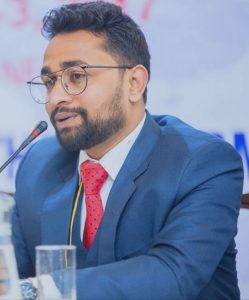Roshan Kumar Karn puts in 16 to 18 hours, seven day a week, working at two hospitals in Nepal’s capital city of Kathmandu caring for the influx of patients with COVID-19.
“It’s a really difficult time. It’s physically and mentally exhausting,” says the 27-year-old medical doctor, who works in the cumbersome, but necessary, personal protective equipment. “But this is my job and I’m passionate about medicine.”
As a student and participant in SPARC’s OpenCon program for early career open advocates, Karn recognized the value of the open sharing of research. In 2013, he
established Open Access Nepal and has hosted regional meetings to garner support. Through hardships of earthquakes, political instability, and now the novel coronavirus, Karn has been a leader working with policy makers and campus administrators to advance Open.
With the country straining to manage the pandemic and provide information to healthcare workers on the frontlines, Karn is pushing for innovative approaches to sharing data and expanding access to educational materials.
“With the emerging crisis of COVID-19, we believe that openness is more necessary than ever,” says Karn. “We are not sure when we are going back to normalcy, and we need to have access to information with the click of a button from anywhere.”
Working to contain this new disease, physicians are eager for the latest information on new protocols for COVID patients – as well as people battling other conditions. Karn is laying the foundation for a freely available app he hopes to launch called Open Medicine, which will provide doctors in Nepal with instant access to treatment options based on diagnoses.
The aim is to reduce the referral rates and need to travel from elsewhere in the country to hospitals in Kathmandu. Nepal has difficult terrain – in some places the only means of transportation is walking – and air travel to the capital is expensive. Once in the city, many discover government hospitals are at capacity because of the influx of COVID-19 patients. For most, private hospitals are not affordable and without insurance people have to pay out of pocket for treatment. Also, families who bring loved ones to Kathmandu encounter expenses while awaiting access to healthcare.
Yet, small villages in the country have Primary Health Care centers with physicians and healthcare assistants. “With Open Medicine, our aim is to equip these people with the resources – diagnosis, treatment protocols, medicine for specific diagnoses – so that they don’t have to refer these low income group people to tertiary centers,” Karn says. “This will eliminate the need for referral, aid in timely treatment, reduce significant costs for the patients, provide access to treatment to those people who would otherwise be unable to visit the capital city for treatment and in the long run will reduce the mortality and morbidity amongst these patients.”
Karn adds that the concept of Open Medicine aligns with the United Nations Sustainable Development Goals to reduce mortality of patients by giving adequate resources for diagnosis and treatment.
The app would be similar to UptoDate, which is used by clinicians around the world to quickly distill the latest medical research and aid in treatment decision making. Karn is working with other physicians involved with OA Nepal to do a feasibility study for the project and customize the app for Nepal. The team is talking with deans of medical school and the Ministry of Education (MOE) to raise funds for the project.
“Access to research should come free or with a minimal cost. It’s about equality – the basic human right to have access to quality publications, research and education,” Karn says.
Karn is also collaborating with the MOE to establish a digital library to give children in Nepal access to learning materials. With schools closed for months and no plans to reopen, the project has a new urgency.
“The COVID pandemic has emphasized the importance of Open Access and Open Education more than ever,” Karn says. “I intend to explore all avenues which will further our agenda of openness.”
At OpenCon in 2015, Karn was recognized with the Right to Research Coalition Next Generation Leadership Award.
Of the Open effort in Nepal, Karn says: “It’s a huge struggle, but I’m really optimistic. I never thought we’d get this far in a country that faces so much poverty. We will make our dreams come true.”
